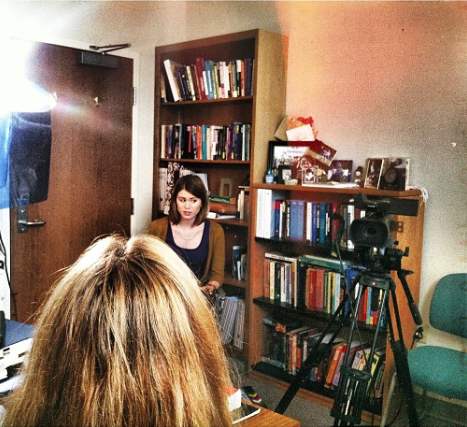 Increasing numbers of teens and young adults are using self-injury as a strategy for dealing with negative emotions. A recent World Health Organization (WHO) collaborative study found the number of teenagers who self-harmed in England had tripled in the last decade. The 2013-2014 survey found 20 percent of 15-year-olds had self-harmed over the past year, as compared to 6.9 percent of 15- and 16-year-olds in 2002. Approximately 15 percent of American teens have admitted to some type of self-injury. Among college students, self-injury rates range from 17 to 35 percent, according to Theravive. However, the actual number of youth who self-harm is likely much higher, as it is stigmatized behavior, usually done in private. People take great care to cover their scares.
Increasing numbers of teens and young adults are using self-injury as a strategy for dealing with negative emotions. A recent World Health Organization (WHO) collaborative study found the number of teenagers who self-harmed in England had tripled in the last decade. The 2013-2014 survey found 20 percent of 15-year-olds had self-harmed over the past year, as compared to 6.9 percent of 15- and 16-year-olds in 2002. Approximately 15 percent of American teens have admitted to some type of self-injury. Among college students, self-injury rates range from 17 to 35 percent, according to Theravive. However, the actual number of youth who self-harm is likely much higher, as it is stigmatized behavior, usually done in private. People take great care to cover their scares.
“People who self-harm are scared of what they’re doing, ashamed of what they’re doing. Self-injury hasn’t really been talked about, so we freak out about it,” said USC student Monica Zinn, who made the documentary short, “Self Inflicted,” to bring increased awareness and understanding to the issue.
Non-suicidal self-injury (NSSI) is a direct and deliberate act to damage body tissues, such as cutting, carving, scratching or burning the skin, in order to relieve emotional distress. NSSI in the extreme form may also include breaking one’s own bones. People tend to self-harm to deal with negative emotions, such as depression, anxiety or anger. The act of self-harm brings temporary relief to one’s emotional suffering.
“Everyone has points of extreme emotional distress. We all just handle it in different ways,” said Zinn. Where others may use drugs or sex to cope with emotions, she said that self-harmers use NSSI for relief.
Zinn, 21, grew up not knowing anything about NSSI. “When I was younger, maybe 14 or 15, I started meeting people who hurt themselves. It absolutely terrified me,” she admitted. Adults never told her what self-harm was, and media didn’t give her any helpful information. “My peers were doing that to themselves, and if they weren’t close to me, I couldn’t ask them about it.”
To better understand what her peers were going through, Zinn felt compelled to learn more about self-harm. “If there’s something I can’t empathize with, then I have to find out more about it,” said the young filmmaker. “I feel like I know more about myself when I understand people more.”
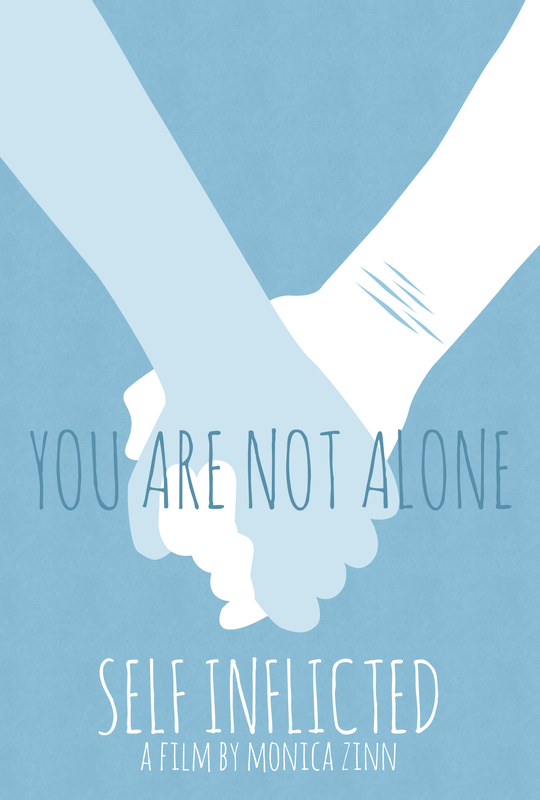 Working on her documentary for three years, Zinn buried herself in research on self-injury. She said she could not find a lot of media on self-harm that rang true. Most of it was sensationalistic and scary. Her film aimed to be authentic, informative and empathetic.
Working on her documentary for three years, Zinn buried herself in research on self-injury. She said she could not find a lot of media on self-harm that rang true. Most of it was sensationalistic and scary. Her film aimed to be authentic, informative and empathetic.
“Even though I hadn’t ever harmed myself, I knew people who had,” said Zinn, “and because of that, I could check the legitimacy of research or media texts I found with them and see if it rang true.”
Doing research for her documentary, Zinn found that people who self-harm tend to be very empathetic and sensitive people, susceptible to feeling more emotional pain than others. She also discovered that self-harm is seen in animals and young children. In a 2012 study, the journal Pediatrics reported that approximately 8 percent of children ages 7 to 16 had attempted self-injury.
“Kids hurt themselves on purpose a lot,” said Zinn. “I talked to a 3-year-old who said she would pick at her finger because her parents were upset. It’s very natural to do when you’re very anxious or dealing with a lot of stress but don’t know how to cope with that. One parent told me that her eight year old used to bang his head against the wall when he would get upset.”
Zinn talked to friends and used social media to invite people to share their stories about self-injury. Lauren Kristen, also a photographer, was encouraged to share how she sees the world when she thinks about self-harm. One of the more touching segments of the “Self Inflected” is Lauren’s interview with her sister Grace.
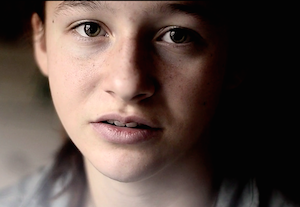 Grace confesses to how difficult it is for her to understand why her sister hurts herself to feel better. “It’s sad because I don’t know how to help her with it, but I don’t want to overstep my boundaries with it. Self-harm has always made me squeamish. Because I personally have never understood it,” she said in the film. “It sort of makes me sad because there’s other ways to deal your pain.”
Grace confesses to how difficult it is for her to understand why her sister hurts herself to feel better. “It’s sad because I don’t know how to help her with it, but I don’t want to overstep my boundaries with it. Self-harm has always made me squeamish. Because I personally have never understood it,” she said in the film. “It sort of makes me sad because there’s other ways to deal your pain.”
Zinn was touched by Lauren’s boldness to share the effects of self-harm on the family. “There’s confidence in Lauren. She understands her family may not understand it but feels comfortable talking about it,” said Zinn. “It’s obvious that there’s so much love in the family.”
Viewers especially seem to relate to Grace’s struggle to understand self-harm. “We’re not trying to ostracize or judge someone who harms or anyone who doesn’t understand self-harm,” Zinn said. “It’s okay for you to feel that way. It’s big of you to watch this film even when you don’t understand.”
Both “Self Inflicted” and her 2011 film “Perfection,” were inspired by Zinn’s desire to know about things for which there were not a lot of reliable information and genuine, firsthand accounts. The earlier film was about disordered eating and was initially made as a student project when Zinn was just 17. The adapted version went onto receive Best Documentary Film at the Virginia Student Film Festival and was accepted in several film festivals across the country.
“It was really just showing me how powerful this medium is,” she said. “It showed me that this side of eating disorders, of mental illness, of young women really isn’t being shown. There are tons of people who want to see this side of things, and have this sort of honest conversation with young women who are struggling with eating disorders.”
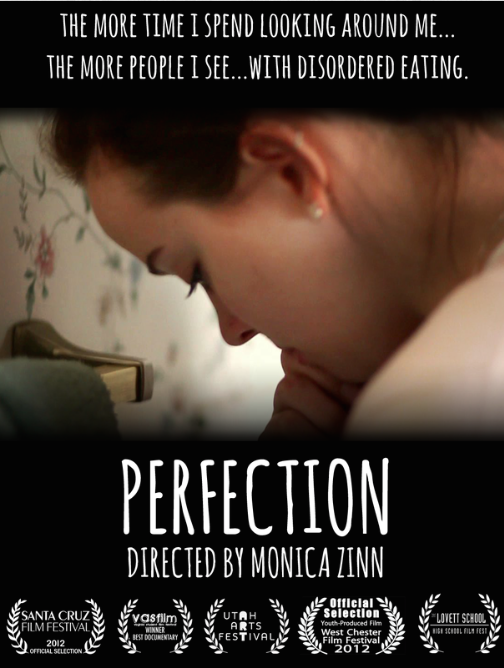 The documentary “Perfection” was inspired by a blog on eating disorders that one of the main characters wrote. After Zinn spoke with her, the filmmaker started thinking about her own friends struggling with eating disorders, one of whom had recently been to an eating disorder facility for her struggles with eating. Many of her friends with disordered eating were driven by the overwhelming desire for control and perfection.
The documentary “Perfection” was inspired by a blog on eating disorders that one of the main characters wrote. After Zinn spoke with her, the filmmaker started thinking about her own friends struggling with eating disorders, one of whom had recently been to an eating disorder facility for her struggles with eating. Many of her friends with disordered eating were driven by the overwhelming desire for control and perfection.
“We all get weird about food. We all get weird about the body. I am control freak myself in different ways, so I can relate to that compulsion,” she said. “I was really lucky that my interview subjects opened up to me, and it helped that they were close friends of mine.”
The young women featured in “Perfection,” suffered from a combination of bulimia, anorexia and EDNOS (eating disorder not otherwise specified). All of them eventually went to rehabilitation facilities for their disordered eating. However, it took viewing the film for Shannon to finally realize how unsustainable her behavior was; then, she too sought help.
“We’ve seen lately much more awareness of depression. I think that’s really helped us be more comfortable with the subject, to bring the subject up,” social worker Cheryl Hundsberger said in the film. “And I think the same could be said of eating disorders if we had more knowledge and more awareness. I think we would key into that quicker.”
Zinn’s films are helping to do just that. Her next documentary, “Noxious,” hits even closer to home, as it was inspired by her own personal trauma. As a student at USC, Zinn was a drugged last semester and suffered a serious concussion that busted open her head and caused her to lose consciousness.
Many people she told about the assault afterward responded, “Thank God you weren’t sexually assaulted.” But with the bottom face of her face black and covered with bandages, Zinn took some offense at how her experience was being downplayed. She said, “It took me a while to convince myself that what happened to me was an act of violence.”
Though she originally would refer to the incident as “an accident,” her therapist helped her see the act of being drugged as a physical assault. “Someone took control of your body and because of that, you were hurt in a way you wouldn’t have been if you weren’t under the influence of that drug,” her therapist said.
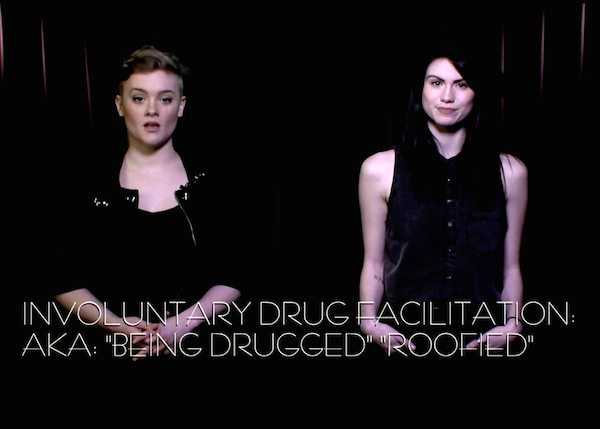 Zinn soon came to discover that drugging someone is considered assault in most states. “Most people have no idea that this is a felony in a lot of states, and even if they do, it’s still a faceless crime,” she said. “You won’t get a prosecution if no one saw it happen, and you won’t remember. Also, a toxicology report may show date-rape drugs such as Rohypnol or GHB, in your system, provided it’s in the 60 hour time frame, but those aren’t the only drugs used to assault people.”
Zinn soon came to discover that drugging someone is considered assault in most states. “Most people have no idea that this is a felony in a lot of states, and even if they do, it’s still a faceless crime,” she said. “You won’t get a prosecution if no one saw it happen, and you won’t remember. Also, a toxicology report may show date-rape drugs such as Rohypnol or GHB, in your system, provided it’s in the 60 hour time frame, but those aren’t the only drugs used to assault people.”
Certain medications mixed with alcohol can make people “drowsy, feel ‘good’ and, thus, more inclined to do things they wouldn’t normally do. They impair your judgement and increase the likelihood of making risk-taking decisions,” she said.
In Zinn’s case, no one at the hospital thought to ask her if she was drugged or to test her for anything. At the time, she didn’t realize that it was obvious to the medical staff that she’d been drugged, due to the type of physical damage she’d experienced in her fall. She was initially ashamed because she didn’t really remember anything and thought she must have drank too much. She finally came to realize that what happened to her was an “off-the-fringe kind of violence.” She said, “And to have spent all that time talking it down to an accident… it was very painful to realize what this really was: a physical assault, a felony.”
After the assault, Zinn experienced a lot of anxiety and depression. “I’ve been in places where I feel like I want to do something drastic, but because of the work I’ve done, I know it won’t give me what I’m looking for,” she said. “But it’s hard not to go with your immediate impulse. The biggest thing for me was to ask myself, ‘What do I really want—do I want to be happy and thriving?’ If I hurt myself, or worse, it’s not going to solve or change anything. I look at long-term coping mechanisms to help ease my suffering but not quick fixes.”
Mindfulness meditation has helped her to combat a racing mind and the reactive behavior that arises from the involuntary thoughts of automatic thinking. This type of cognitive behavioral therapy has also proved helpful to people struggling with disordered eating and to those with the compulsion to self-harm.
Since the drugging, the documentary filmmaker has also become a big advocate of setting boundaries, speaking up for her self and not being afraid to not be polite. After her older sister’s untimely death at age 19, when Zinn was 16, she and her siblings lived very much in the public eye of their northern Virginian community. She grew used to talking about anything people asked her—even when she didn’t particularly want to—and to trying to make people feel comfortable with what she was going through, instead of paying attention to how she felt.
“For four years after that, I always felt my issues were on the table for everyone. I felt like I was almost too open. That way of being that wasn’t very sustainable. I pushed my feelings back into myself somehow,” she said. “What I’ve been learning now is that it’s a sign of insecurity to give that much of yourself up. I would get taken advantage of a lot because I would give people everything, including my soul.”
She has since taken to spending a lot of time with herself, as she used to when she was a young child telling herself stories. “I was so self-focused as a kid and was really just trying to explore myself and the world around me. I didn’t feel a lot of suffering as a child,” she said. Today she continues to “absorb things that make me understand the world around me better.”
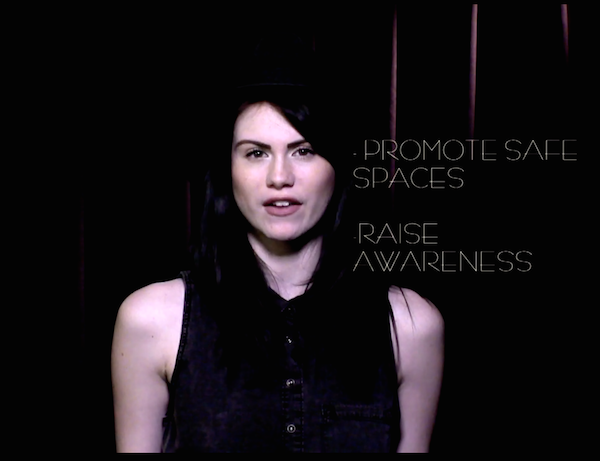 Zinn was inspired to make the documentary “Noxious” to help others understand the world around them better as well. Through the film, she aims to provide a resource and safe place for people to discuss the experiences of being drugged. “It’s not talked about at all. It’s very scary not knowing what to do and to explain what happened,” she said. “People should know there is no judgment about what you were doing beforehand because it’s not your fault. Here’s what you’re going to need in order to prosecute. Find a witness. Get a toxicology report.”
Zinn was inspired to make the documentary “Noxious” to help others understand the world around them better as well. Through the film, she aims to provide a resource and safe place for people to discuss the experiences of being drugged. “It’s not talked about at all. It’s very scary not knowing what to do and to explain what happened,” she said. “People should know there is no judgment about what you were doing beforehand because it’s not your fault. Here’s what you’re going to need in order to prosecute. Find a witness. Get a toxicology report.”
The documentary “Noxious,” which is currently in pre-production, will be a success in Zinn’s eyes “if it can help anyone get a prosecution or if it can increase reports of [being drugged].”
Readers can learn about drugging laws in their state or anonymously share their story about being drugged at the Noxious website.
“Once people see something they connect to, they’ll reach out,” Zinn said. “When I start telling people what I’m working on, in this instance my drugging documentary, I start to hear stories everywhere I go….’”
Assistant producer Astri Griel is on board to aid Zinn tactically and emotionally through the film. “Obviously this film is going to be triggering for me,” she said. “It’s hard to make emotionally, so it’s nice to have a more solid backbone, to have that other person there if something goes wrong.”
Zinn’s films not only build awareness, they also build communities of support and understanding. “Self-Inflicted” is an official partner of 7 Cups of Tea, which provides free, confidential conversations with trained active listeners on topics like traumatic experiences, eating disorders and self-harm.
Self Inflicted will be released online March 13 at www.monicazinn.com
Leave a Reply